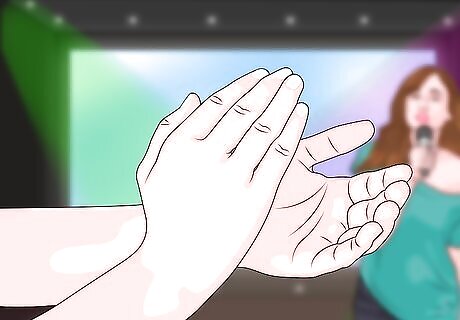
views
Practicing Your Karaoke Style

Choose a signature song. In Japan, they call it "juhachiban", "#18" in South Korea and "banquet song" in Hong Kong, but you can just call it "the song you're going to be totally awesome at". You might be tempted to pick an obscure song that you're really passionate about, but when you're starting out, try to pick a song that many people are familiar with and enjoy. The audience will have more fun listening and cheering you on, which will make things easier for you! Choose well-known songs that are in your range. Can you reach the high notes without screaming? Can you reach the low notes? Make sure the melody is easy to hum and that you can feel the rhythm easily. Learn the melody and study it as thoroughly as you would study any other subject. Record yourself and listen back. Taking time to write out all the words will help you memorize them quickly. Upbeat songs tend to be better crowd pleasers than slow songs. It should still be something that you enjoy singing along to, though, and make sure it's within your vocal range. "Twist and Shout" by the Beatles is a safe choice; for female vocals, go for ABBA, Gloria Gaynor, or Madonna; guys should look into Sinatra, and Tom Jones. As you gain your confidence, you can choose more challenging or lesser known music.

Practice at home. If you can get your hands on a karaoke machine, use it! Otherwise, you can usually dig up the karaoke version of a popular song on the Internet, and lyrics are easy to find. Play the song often, and sing it all the time. Sing while you're cleaning, during commercials, as you're washing the dishes...Practice makes perfect. You want to get to the point where you know the song by heart. Try to get the instrumental tracks on cassette or CD so you can sing along without hearing the other singer. If you always practice singing with someone else's voice, you will never learn to lead with your voice. Background tracks to the most popular songs are generally available at record stores and media outlets. Go to the Internet if you can't find them in your town. When possible, practice while holding a microphone (or a hairbrush) since that's what you'll be doing when you perform. To improve your karaoke, listen to the song with headphones and record yourself singing along. When you play it back, how do you sound? If you have a full length mirror or, better yet, a camcorder, use it!

Work on your voice. Singing is a very physical activity and requires a power source. Support your voice tone the way you would support your body when you're lifting something heavy. Get your legs under you, tuck your hips under, and use strength from the lower part of your body—as if you were lifting. Push the balls of your feet firmly into the floor. Try not to lift your chin; instead, keep your head rounded over the microphone with your chin lower in the front. This makes the tone sound warm and resonant.

Sing the words. Actually think about what the words mean. It's surprising how much better we sound when we really mean what we're saying. Choose songs that are age-appropriate so you're not trying to be convincing in a song about your six kids and three divorces.

Calm your fears. Try writing down all the things they think could go wrong-going off pitch, forgetting the words, falling down-whatever they fear most. Then sing and make all those mistakes—just do a terrible job. This is not as easy as it sounds. You'll find it's almost as hard to be terrible as it is to be perfect, but once you've done it a few times, you'll find this exercise helps put your performance fears to rest. Beyoncé Knowles Beyoncé Knowles, Singer & Businesswoman If you experience nerves, channel them so that they fuel you. "I think it's healthy for a person to be nervous. It means you care – that you work hard and want to give a great performance. You just have to channel that nervous energy into the show."
Preparing and Performing

Pick your stage. Visit a few different karaoke bars and clubs and look for the following: Is there a supportive crowd? Some karaoke venues have regulars who are friendly and who cheer each other on. That's what you're looking for--not a place with high "turnover" and bad sports who complain about bad singers. Does the singer have to face the audience? Check how the screens are arranged. You might want to have the option of facing away from the audience so that if you get too nervous, you can look at a screen that doesn't force you to look at the audience.

Find a karaoke box. In East Asia, karaoke is often enjoyed in a more private setting, rather than in bars or clubs. You can rent a karaoke-equipped room by the hour or half-hour and share the costs with a few friends. This is an excellent way to ease into karaoke because you can hand-pick your audience. Karaoke boxes aren't as common in other parts of the world as they are in East Asia, but it's definitely worth looking into. They're very popular in New York City and the San Francisco Bay Area, and they might be found wherever there's a strong Asian community. You can also investigate how much it costs to privately rent an actual karaoke-equipped venue; if you get enough people together to chip in, it could work.

Partner up. Before you take the plunge and sing by yourself, find a decent singer to do karaoke with. It should be someone who's already comfortable singing in public, and who can garner a little bit of cheering and clapping. You might be nervous the whole time, but in the end, when it's over and done with, you'll feel good about having performed, and the next time won't be as intimidating.

Ham it up. Getting up to sing is a chance to act out your "star" fantasies. Go all the way. Find the "ham" in you. Wear some glam clothing, do some rock and roll moves, sing your heart out. In truth, most people would rather see you succeed than fail, and giving a full-out performance will always go over better than hanging back. Trust me. Things don't improve when you sound as if you're apologizing for giving such a rotten, worthless performance.

Be a good audience member. Once you've picked a venue, go regularly, and be a good sport. Cheer everyone on. Clap after every song. Avoid wincing when someone's voice cracks. It's good karaoke karma, because eventually when you get up to sing, they'll recognize you and they'll cheer you on. Also, you'll recognize them, and they won't feel like strangers anymore.

Have fun! This, of course, is the most important part. Smile, move to the music, and enjoy your time in the spotlight. You're not there to impress people--you're there to have a good time, and the audience wants to have a good time with you, so be bold and sing your heart out.



















Comments
0 comment